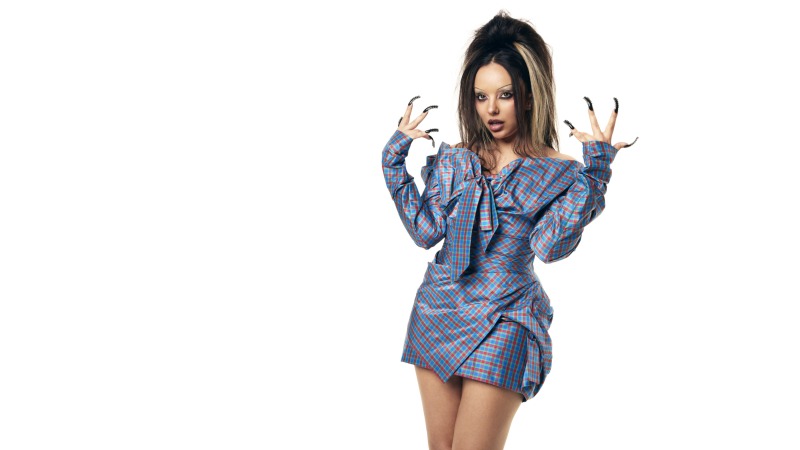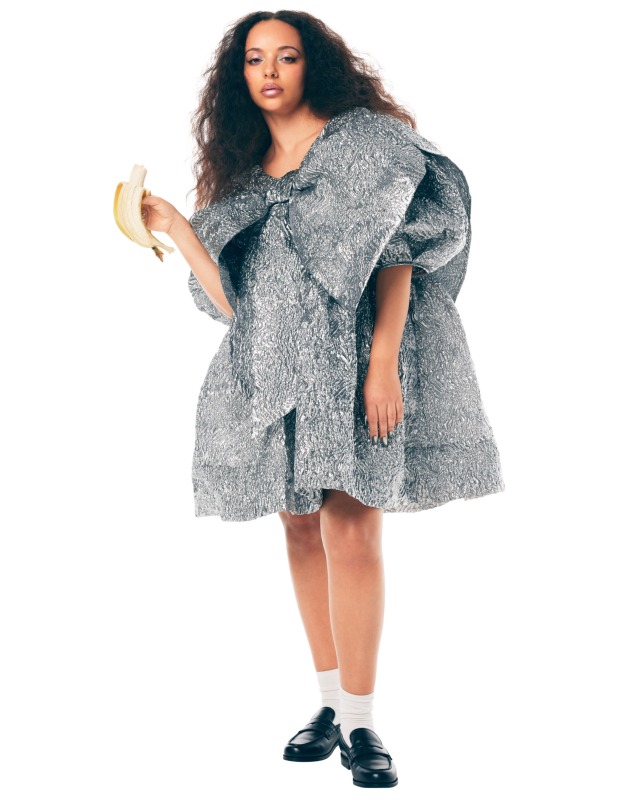COVER STORY | JADE Plays the Game
The English musician spoke with Paste about Little Mix’s hiatus, the responsibilities of being a pop diva, selling butt plugs as merch, rediscovering her Arabic heritage, and her long-awaited solo debut, That’s Showbiz Baby!
Photos by Conor Cunningham
“Through the Wire,” “Royals,” “Video Games,” “Losing My Edge,” “Galang,” fucking “Tik Tok.” These are the brilliant debut singles that have helped shape the last 25 years of music. We can add “Angel of My Dreams,” the inaugural glimpse of Jade Thirlwall’s solo career after the dissolution of her longtime band, Little Mix, to that list now, too. With this current era of focus-group pop banality both rampant and oversaturated, “Angel of My Dreams” is bonkers, zig-zagging through strips of falsetto, vibrating electroclash, and Sandie Shaw’s nearly unrecognizable voice, which gets doubled, halved, chopped, screwed, and funneled into a synthesizer across the first three minutes of That’s Showbiz Baby!’s splashy maximalism.
By the time she wrote “Angel of My Dreams,” Jade was fed up with searching for her first single. “I knew I wanted to do something a bit crazy, but it was really hard getting in the room with people that were willing to not write what they thought would be a radio hit or TikTok viral moment,” she tells me, sitting in her home in London. “I was struggling to find people who were willing to push it.” She’d been in Los Angeles for too long, coming in and out of writing sessions that yielded no results. “I was in a really foul mood when I turned up to the studio.” The stars aligned when Mike Sabath, Pablo Bowman, and Steph Jones got in a room together, after Sabath showed up late and Bowman and Jones brought their own grievances into the studio. “The head of [RCA] had just left, so I was freaking out about that and what that would mean for me as an artist. I was sick of the industry,” Jade remembers. “But we were all in a good enough bad mood to write a song like ‘Angel of My Dreams,’ because we were mourning about the industry.”
She didn’t want to write about love in the typical sense, but as her truth—a woman in her thirties who’d spent, by then, the first decade of adulthood in a toxic relationship with show-business, in a group formed on The X Factor UK in 2011. Jade wanted to write about, as she puts it, “that love-hate, almost tragic desperation that I have to be loved and accepted in the industry.” So it started with a sample of Shaw’s “Puppet on a String” (one of two samples on That’s Showbiz Baby!, the other being the Supremes’ “Stop! In the Name of Love” on “Before You Break My Heart,” in a clip of young Jade singing the chorus), which Jade had tried using in a Little Mix song for years. “We always resented that statement in the press, ‘Oh, they’re just manufactured puppets,’” she admits. “To a degree, I guess we came from an entertainment show and we were put together. It’s semi-true, I was a bit of a puppet, but we always resented it, because we did write our own music. We did stand the test of time. We worked so hard to become credible.” Then came the “I will always love you and hate you, it’s not fair” chorus.
Jade wanted to make a “Frankenstein pop record that no other artists could do” by fusing Motown and Clubland compilations together. She and Sabath, Bowman, and Jones changed the tempo and pitched-up the vocal, because they “wanted it to sound desperate and sad but with this crazy beat.” If you don’t know about Sandie Shaw, you’d never know she was being sampled. Jade was, at first, resistant to getting personal in the verses. “But then I was like, ‘Fuck it, I’ve written so many songs. I’m just going to tell it how it is.’ Honestly, I thought the label would be like, ‘This is mental, no way.’ But to my delight, everyone was like, ‘Oh, my God, you found it. This is the one.’ The relief was everything. I don’t think I’ll ever be able to write another ‘Angel of My Dreams,’ because it really was just one of those once in a lifetime moments. It’s the most ‘me’ a song could ever sound.”
Jade has been unraveling the threads of That’s Showbiz Baby! at her own pace, releasing six singles since July 2024. She calls the strategy “sexy edging,” noting that it’s her way of keeping both the longtime Little Mix fans and new listeners equally engaged. “For new fans, they need to hear more music before they invest in it, whereas the old fans will, arguably, be there the whole time, even if they do moan about the album taking so long,” she says, with a grin. She’s been slowly unlearning herself from the recurring pace to which she and her Little Mix bandmates were conditioned to make albums. “I’ve been on that hamster wheel for over a decade, so I’ve really struggled to understand that it doesn’t have to be like that. I do think, for my next record, I will just get it out.” But for That’s Showbiz Baby!, she’s setting a tone, letting her versatility color the statement she wants to make as a soloist. That’s why she’s drip-fed her audience with “Angel of My Dreams,” “It Girl,” “FUFN (Fuck You For Now),” “Plastic Box,” “Midnight Cowboy,” and “Fantasy” for 14 months.
The randomness of her singles afforded Jade a chance to give away parts of herself without being pigeonholed. She was passionate about that, she says, regardless of the consequence. “I’ve done the years of pandering to what I think is a big #1 here, what’s going to work on the radio. I’ve done all that. I’ve clocked that game,” she elaborates. “This is just about me creating stuff that I love.” She could have followed “Angel of My Dreams” with the techno sauce of “It Girl,” because it would have made the most sense sonically, but following a hyper-pop song with a “disco-infused towny song” like “Fantasy” and, then, counteracting that with a “big pop banger” like “FUFN” felt like a more radical, interesting option. “I was intrigued to see what people thought of each thing, because it’s new for me, too,” she says. “It’s all about owning that for myself and not being pushed into any creative decisions I didn’t want to do.”
After Little Mix’s record-setting final Confetti Tour show at the The O2 Arena in London, Jade returned to her flat, sat on the sofa, opened up her diary, and found nothing in it. “I was so scared, because my whole adult life, I’d had at least a year’s worth of diary mapped out for me,” she says. “I was feeling like I didn’t know how to exist outside of that group.” So, in an effort to make herself busy, she went on trips with friends and traveled to whatever city her boyfriend, singer Jordan Stephens, was performing in. “In my head, I was like, ‘Okay, I’m going to quickly write a record. I’m going to put it out there. I have to stay relevant and jump on the hype of the band going on a hiatus.’ But thank God I didn’t, because I listened back to some of that music and was like, ‘Wow, that really was just another Little Mix record.’” And in an effort to avoid retreating into the “universal blanket” that covered the group’s music, Jade forced herself to rediscover the music she loved before The X-Factor. “Little Mix was all about girl power and sisterhood and ‘fuck boys.’ I was like, ‘Well, that’s kind of not my truth anymore,’” she admits. “What do I want to say? It was being in the industry, falling in love, battling my own inner demons.”
14 years ago, Jade, Perrie Edwards, Leigh-Anne Pinnock, and Jesy Nelson all auditioned for The X-Factor as solo artists but failed to make it beyond the show’s “bootcamp” installment. They were then put into two separate groups, Orion and Faux Pas, but failed at that, too. On their third chance, the judges—Kelly Rowland, Gary Barlow, Tulisa, and Louis Walsh—paired the four girls together and called them Rhythmix. After a dispute with a Brighton-based children’s music charity of the same name, the group renamed itself Little Mix in the middle of the competition and, two months later, became the first of its kind to win the series. Their debut single, a cover of Damien Rice’s “Cannonball,” topped the UK Singles Chart a week later and signed with Simon Cowell’s Syco Music label.
Little Mix released six albums in eight years before announcing its hiatus four years ago. Nelson, who left the group in 2020 to mental health concerns, released an embarrassingly hackneyed and obtuse debut single two months earlier. Pinnock released her debut EP, No Hard Feelings, in 2024, while Edwards’ debut album is due later this month. “How often was having a solo career on your mind when Little Mix was still going?” I ask Jade. “Very, originally,” she says. “But, honestly, the minute we got put together, it just went away. It felt right, and I never questioned it for the next ten years. And I think, towards the end, we all started thinking, ‘Oh, might be nice to do our own thing at some point.’” She loved being in a girl band, like the Pussycat Dolls and Destiny’s Child. “For me, at 18, I couldn’t see myself in that kind of group, because I was so nerdy and innocent. I worried about bitchiness or girls fighting for the spotlight. I had my qualms about it but, once I got put with the girls, it changed, because we were all on the same wavelength and we all wanted to be equal.”
-

-

-

-

-

-

-

-

-

-

-

-

-

-

-

-

-

-

-

-

-

-

-

-

-

-

-

-

-

-

-

-

-

-

-

-

-

-

-

-









































